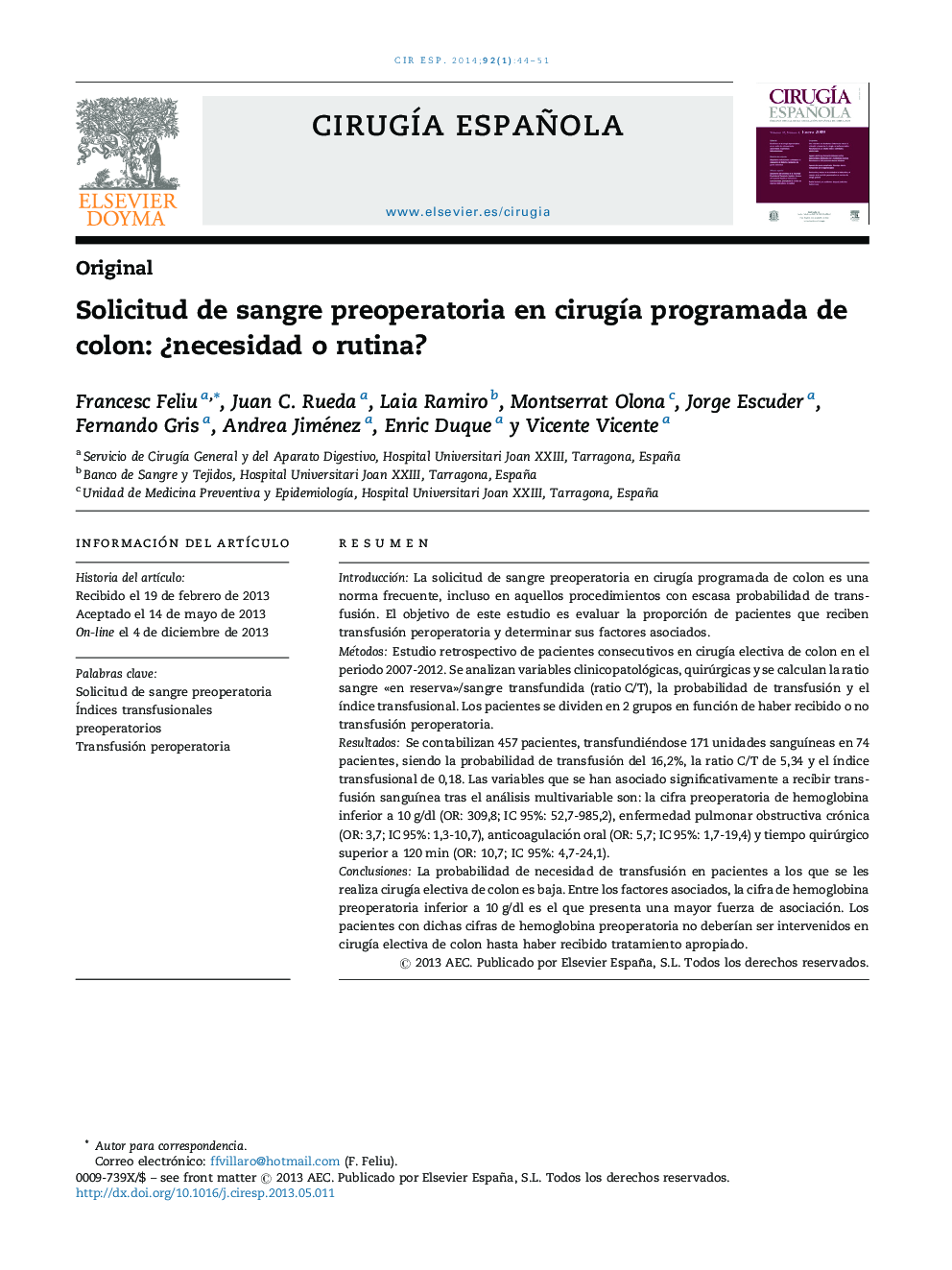| Article ID | Journal | Published Year | Pages | File Type |
|---|---|---|---|---|
| 4252536 | Cirugía Española | 2014 | 8 Pages |
ResumenIntroducciónLa solicitud de sangre preoperatoria en cirugía programada de colon es una norma frecuente, incluso en aquellos procedimientos con escasa probabilidad de transfusión. El objetivo de este estudio es evaluar la proporción de pacientes que reciben transfusión peroperatoria y determinar sus factores asociados.MétodosEstudio retrospectivo de pacientes consecutivos en cirugía electiva de colon en el periodo 2007-2012. Se analizan variables clinicopatológicas, quirúrgicas y se calculan la ratio sangre «en reserva»/sangre transfundida (ratio C/T), la probabilidad de transfusión y el índice transfusional. Los pacientes se dividen en 2 grupos en función de haber recibido o no transfusión peroperatoria.ResultadosSe contabilizan 457 pacientes, transfundiéndose 171 unidades sanguíneas en 74 pacientes, siendo la probabilidad de transfusión del 16,2%, la ratio C/T de 5,34 y el índice transfusional de 0,18. Las variables que se han asociado significativamente a recibir transfusión sanguínea tras el análisis multivariable son: la cifra preoperatoria de hemoglobina inferior a 10 g/dl (OR: 309,8; IC 95%: 52,7-985,2), enfermedad pulmonar obstructiva crónica (OR: 3,7; IC 95%: 1,3-10,7), anticoagulación oral (OR: 5,7; IC 95%: 1,7-19,4) y tiempo quirúrgico superior a 120 min (OR: 10,7; IC 95%: 4,7-24,1).ConclusionesLa probabilidad de necesidad de transfusión en pacientes a los que se les realiza cirugía electiva de colon es baja. Entre los factores asociados, la cifra de hemoglobina preoperatoria inferior a 10 g/dl es el que presenta una mayor fuerza de asociación. Los pacientes con dichas cifras de hemoglobina preoperatoria no deberían ser intervenidos en cirugía electiva de colon hasta haber recibido tratamiento apropiado.
BackgroundPreoperative blood ordering is frequently in elective colon surgery, even for procedures that rarely require blood transfusion. Most often this procedure is performed without proper analysis of the real needs. The aim of this study was to evaluate the patients who receive transfusion and determining their associated factors.MethodsRetrospective study of all consecutive patients scheduled for elective colon surgery was carried out at 2007-2012. Several clinico-pathological and surgical variables were analyzed and predictive blood transfusion indices such as the cross-matched/transfusion ratio (C/T ratio), transfusion index and transfusion probability were calculated. Patients were divided in 2 groups according have received perioperative surgical transfusion or not.ResultsThere were 457 surgery patients. A total of 171 blood units, in a 74 patients were perioperative transfused. Overall cross-matched transfused ratio was 5.34, the transfusion probability 162%, and the transfusion index 0.18. Variables that were significantly associated with receiving blood transfusion in a multivariable analysis were a preoperative haemoglobin level less than 10 g/dl (OR: 309.8; 95% CI: 52.7-985.2), chronic pulmonary obstructive disease (OR: 3.7; 95% CI: 1.3-10.7), oral anticoagulant therapy (OR: 5.7; 95% CI: 1.7-19.4) and surgical time over 120 min (OR: 10.7; 95% CI: 4.7-24.1).ConclusionsLikelihood of receiving perioperative transfusion in elective colon surgery is very low. Among their associated factors, the haemoglobin level less than 10 g/dl is the one with strongest association. Those patients with such low preoperative haemoglobin level should not be scheduled for elective colon surgery until they received specific treatment.
